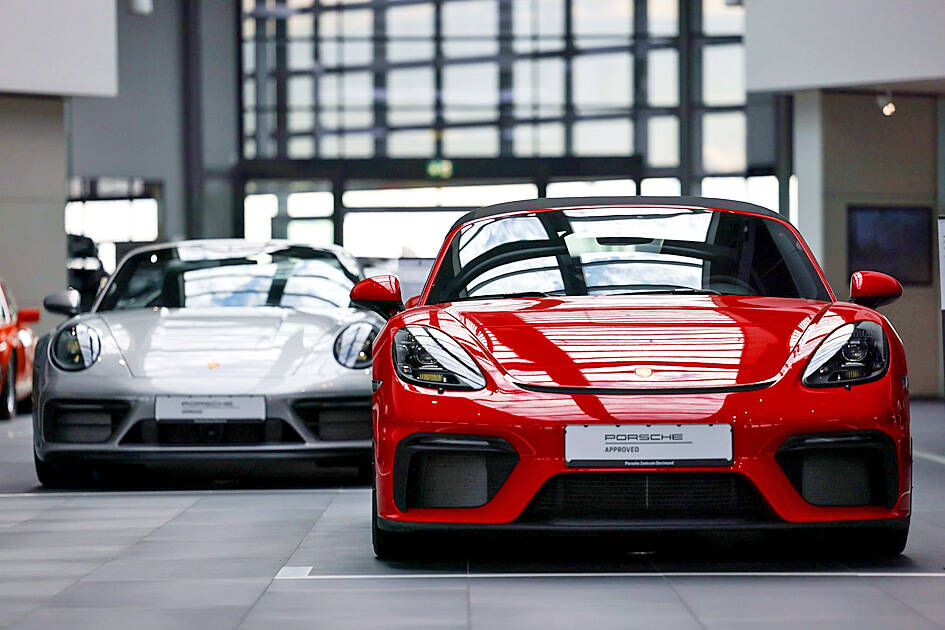Volkswagen AG (VW) is looking to raise as much as 9.4 billion euros (US$9.41 billion) from the initial public offering (IPO) of its iconic sports-car maker Porsche AG in what could be Europe’s largest listing in more than a decade.
The German automaker late on Sunday said that it is seeking a valuation of 70 billion to 75 billion euros for the listing, below an earlier top-end goal of as much as 85 billion euros, with the deal going ahead at a time of deep market upheaval.
European markets have been largely shut to IPOs for most of the year, with companies shying away from seeking new listings because of the region’s energy crisis, rising interest rates and record inflation.

Photo: Bloomberg
Amid the stock market slump, the plan to list is getting a boost from firm commitments of key cornerstone investors. Qatar Investment Authority, Norway’s sovereign wealth fund, T. Rowe Price Group Inc and Abu Dhabi Developmental Holding Co are set to subscribe to preferred shares of as much as 3.7 billion euros, the manufacturer said.
“We are now in the home stretch with the IPO plans for Porsche and welcome the commitment of our cornerstone investors,” VW chief financial officer Arno Antlitz said.
The offer period is to start today with a planned trading start on Thursday next week.
During meetings with potential investors, VW pitched the listing as a chance to invest in a company that combines the best of automaking rivals like Ferrari NV and luxury brands such as Louis Vuitton.
While Ferrari and Porsche both target wealthy buyers, the Italian manufacturer remains in league of its own, boasting industry-leading margins and delivering a fraction of Porsche’s 300,000 annual sales.
Aside from offering investors a slice of one of the most recognizable names in automaking, the IPO would hand back significant decisionmaking power to the Porsche-Piech family, who lost control of the sports-car maker more than a decade ago after a protracted takeover battle with VW.
To account for the interests of the billionaire family, who hold 53 percent of VW’s voting shares via the separately listed Porsche Automobil Holding SE, the Porsche IPO is complex and has triggered governance concerns that mirror those about VW’s convoluted structure.
Investors would be able to subscribe to 25 percent of Porsche preferred shares, which carry no voting rights. The family is to buy 25 percent plus one of Porsche’s common shares with voting rights, meaning they would receive a minority blocking stake and sway on key decisions.
The family has agreed to pay a 7.5 percent premium on top of the price range for the preferred shares and plans to fund the acquisition with a mix of debt capital of as much as 7.9 billion euros and a special dividend paid out by VW.
Proceeds from the deal would help VW with financing its electric vehicle transition and investments in software, the automaker has said.
While interest for the IPO has been high, some investors have said the appointment of Porsche CEO Oliver Blume to the helm of VW and the plan for him to stay on in a dual role raises questions about Porsche’s independence.

The Eurovision Song Contest has seen a surge in punter interest at the bookmakers, becoming a major betting event, experts said ahead of last night’s giant glamfest in Basel. “Eurovision has quietly become one of the biggest betting events of the year,” said Tomi Huttunen, senior manager of the Online Computer Finland (OCS) betting and casino platform. Betting sites have long been used to gauge which way voters might be leaning ahead of the world’s biggest televised live music event. However, bookmakers highlight a huge increase in engagement in recent years — and this year in particular. “We’ve already passed 2023’s total activity and

Nvidia Corp CEO Jensen Huang (黃仁勳) today announced that his company has selected "Beitou Shilin" in Taipei for its new Taiwan office, called Nvidia Constellation, putting an end to months of speculation. Industry sources have said that the tech giant has been eyeing the Beitou Shilin Science Park as the site of its new overseas headquarters, and speculated that the new headquarters would be built on two plots of land designated as "T17" and "T18," which span 3.89 hectares in the park. "I think it's time for us to reveal one of the largest products we've ever built," Huang said near the

China yesterday announced anti-dumping duties as high as 74.9 percent on imports of polyoxymethylene (POM) copolymers, a type of engineering plastic, from Taiwan, the US, the EU and Japan. The Chinese Ministry of Commerce’s findings conclude a probe launched in May last year, shortly after the US sharply increased tariffs on Chinese electric vehicles, computer chips and other imports. POM copolymers can partially replace metals such as copper and zinc, and have various applications, including in auto parts, electronics and medical equipment, the Chinese ministry has said. In January, it said initial investigations had determined that dumping was taking place, and implemented preliminary

Intel Corp yesterday reinforced its determination to strengthen its partnerships with Taiwan’s ecosystem partners including original-electronic-manufacturing (OEM) companies such as Hon Hai Precision Industry Co (鴻海精密) and chipmaker United Microelectronics Corp (UMC, 聯電). “Tonight marks a new beginning. We renew our new partnership with Taiwan ecosystem,” Intel new chief executive officer Tan Lip-bu (陳立武) said at a dinner with representatives from the company’s local partners, celebrating the 40th anniversary of the US chip giant’s presence in Taiwan. Tan took the reins at Intel six weeks ago aiming to reform the chipmaker and revive its past glory. This is the first time Tan